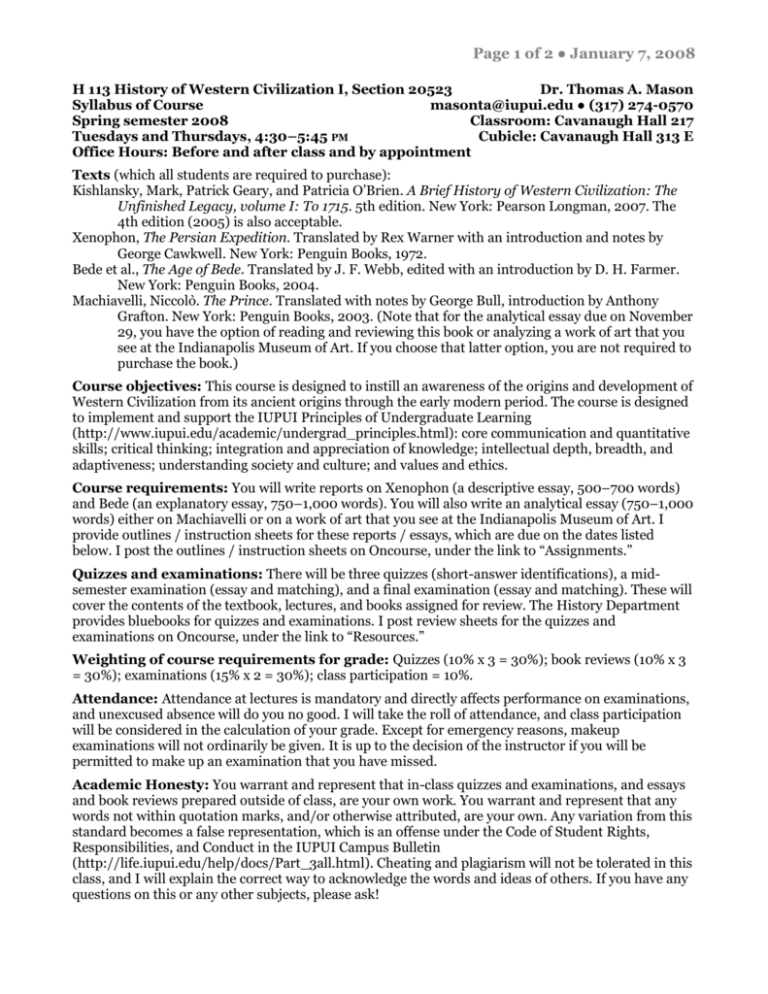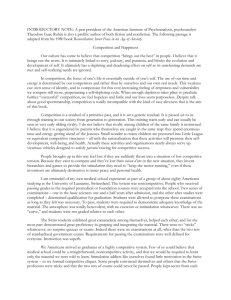
Page 1 of 2 ● January 7, 2008
H 113 History of Western Civilization I, Section 20523
Dr. Thomas A. Mason
Syllabus of Course
masonta@iupui.edu ● (317) 274-0570
Spring semester 2008
Classroom: Cavanaugh Hall 217
Tuesdays and Thursdays, 4:30–5:45 PM
Cubicle: Cavanaugh Hall 313 E
Office Hours: Before and after class and by appointment
Texts (which all students are required to purchase):
Kishlansky, Mark, Patrick Geary, and Patricia O’Brien. A Brief History of Western Civilization: The
Unfinished Legacy, volume I: To 1715. 5th edition. New York: Pearson Longman, 2007. The
4th edition (2005) is also acceptable.
Xenophon, The Persian Expedition. Translated by Rex Warner with an introduction and notes by
George Cawkwell. New York: Penguin Books, 1972.
Bede et al., The Age of Bede. Translated by J. F. Webb, edited with an introduction by D. H. Farmer.
New York: Penguin Books, 2004.
Machiavelli, Niccolò. The Prince. Translated with notes by George Bull, introduction by Anthony
Grafton. New York: Penguin Books, 2003. (Note that for the analytical essay due on November
29, you have the option of reading and reviewing this book or analyzing a work of art that you
see at the Indianapolis Museum of Art. If you choose that latter option, you are not required to
purchase the book.)
Course objectives: This course is designed to instill an awareness of the origins and development of
Western Civilization from its ancient origins through the early modern period. The course is designed
to implement and support the IUPUI Principles of Undergraduate Learning
(http://www.iupui.edu/academic/undergrad_principles.html): core communication and quantitative
skills; critical thinking; integration and appreciation of knowledge; intellectual depth, breadth, and
adaptiveness; understanding society and culture; and values and ethics.
Course requirements: You will write reports on Xenophon (a descriptive essay, 500–700 words)
and Bede (an explanatory essay, 750–1,000 words). You will also write an analytical essay (750–1,000
words) either on Machiavelli or on a work of art that you see at the Indianapolis Museum of Art. I
provide outlines / instruction sheets for these reports / essays, which are due on the dates listed
below. I post the outlines / instruction sheets on Oncourse, under the link to “Assignments.”
Quizzes and examinations: There will be three quizzes (short-answer identifications), a midsemester examination (essay and matching), and a final examination (essay and matching). These will
cover the contents of the textbook, lectures, and books assigned for review. The History Department
provides bluebooks for quizzes and examinations. I post review sheets for the quizzes and
examinations on Oncourse, under the link to “Resources.”
Weighting of course requirements for grade: Quizzes (10% x 3 = 30%); book reviews (10% x 3
= 30%); examinations (15% x 2 = 30%); class participation = 10%.
Attendance: Attendance at lectures is mandatory and directly affects performance on examinations,
and unexcused absence will do you no good. I will take the roll of attendance, and class participation
will be considered in the calculation of your grade. Except for emergency reasons, makeup
examinations will not ordinarily be given. It is up to the decision of the instructor if you will be
permitted to make up an examination that you have missed.
Academic Honesty: You warrant and represent that in-class quizzes and examinations, and essays
and book reviews prepared outside of class, are your own work. You warrant and represent that any
words not within quotation marks, and/or otherwise attributed, are your own. Any variation from this
standard becomes a false representation, which is an offense under the Code of Student Rights,
Responsibilities, and Conduct in the IUPUI Campus Bulletin
(http://life.iupui.edu/help/docs/Part_3all.html). Cheating and plagiarism will not be tolerated in this
class, and I will explain the correct way to acknowledge the words and ideas of others. If you have any
questions on this or any other subjects, please ask!
Page 2 of 2 ● January 7, 2008
H 113 History of Western Civilization I, Section 20523
Date
January
Lecture topics (Approximate)
10
17
24
31
February
7
14
21
28
March
6
13
20
27
April
3
10
17
24
May
Dr. Thomas A. Mason
1
Remember:
Textbook (Kishlansky et al.)
Chapter
Introduction. What is a civilization? Ancients and Moderns
The Earliest Civilizations: Mesopotamia, Egypt, Israel, Assyria
1
Early Greece and Persia
2
Classical and Hellenistic Greece
3
Quiz (covers chapters 1 and 2)
Republican Rome
4
The World of Xenophon
Book review (descriptive essay) due: Xenophon
Imperial Rome
5
Christian Rome
6
Byzantium and Islam
7
Quiz (covers chapters 3–6)
The Carolingian Empire
8
The World of Bede
Review for Mid-semester Examination
The West Encounters the East: Feudalism and the Crusades
9
Mid-semester Examination (covers chapters 8–9)
Spring Break
Book review (explanatory essay) due: Bede
The Plague and the Reconquest
10
The Renaissance: The Rediscovery of Antiquity
11
Visit to the Indianapolis Museum of Art
4000 Michigan Road. Meet inside main entrance.
The Seaborne Empires: Portugal and Spain
12
Quiz (covers chapters 9–11)
The Reformations: The Rediscovery of the Patristic Age
13
The World of Niccolò Machiavelli
Analytical essay due:
book review of Machiavelli or analysis of work of art
The Wars of Religion and the Thirty Years War
14
Economy and Society in Early Modern Europe
15
Absolutism and Resistance
16
Review for Final Examination
Final Examination, 5:45–7:45 PM (covers chapters 13–16).
Please note that the exam time is different from our usual meeting time.
“The past isn’t dead; it isn’t even past.”
—William Faulkner, Requiem for a Nun (1951)
“The past is a foreign country: they do things differently there.”
—L. P. Hartley, The Go-Between (1953)
“We contend, however, that war is nothing more than a continuation of politics with
the mixing in of other means.”
—Carl von Clausewitz, On War (1832)
“Study history. Study history. In history are all the secrets of statecraft.”
—Winston Churchill, The Age of Revolution (1957)
“The supposed ‘clash of cultures’ is in reality nothing more than a manifestation of
mutual ignorance.”
—The Aga Khan, Spirit & Life: Masterpieces of Islamic Art from the Aga Khan
Museum Collection (2007)









